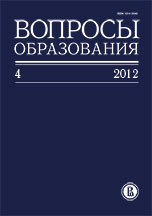От эмпирики к смыслам, от смыслов к осмыслению
Аннотация
Константиновский Давид Львович — доктор социологических наук, руководитель Центра социологии образования, науки и культуры Института социологии РАН. Эл. адрес: scan21@mail.ru
Адрес: Россия, 117218, Москва, ул. Кржижановского, д. 24/35, корп. 5.
В статье предпринята попытка обобщить некоторые результаты исследований стратегий и социального поведения молодежи в сфере образования. Автор опирается на эмпирические данные, полученные в различных проектах за последние годы.
Обсуждается зависимость намерений молодых людей от социально-профессионального статуса родителей и уровня урбанизации поселения: школьники вынуждены адаптировать свою жизненную, в том числе и образовательную, стратегию к реальности в соответствии с существующим неравенством. Те же факторы влияют на формирование образовательной траектории выпускников школ: чем выше социальный статус родителей и уровень урбанизации поселения, тем выше и шансы на поступление в вуз. Отмечается, что описываемое положение характерно для всех лет обследований, с начала 1960-х годов и включая 2000-е.
Приводятся результаты исследования доступности качественного общего образования, которые позволили выявить несколько кластеров российских школ, различающихся как наличием квалифицированных учителей и уровнем оснащенности материальной базой, так и качеством обучения. Зафиксировано, что каждый кластер преимущественно обслуживает конкретную социальную группу. Перечислены основные социальные барьеры при получении качественного общего образования: социокультурный, территориальный, экономический. Подчеркивается, что различия в качестве школьного образования обусловливают неравные шансы на получение дальнейшего (профессионального) образования, создавая условия для воспроизводства социальной дифференциации. ЕГЭ расширяет возможности выбора вуза, но не решает проблему качества школьного образования.
Выводы экстраполируются и на другие сферы жизни общества. Предполагается, что такое расширение интерпретации может способствовать лучшему пониманию происходящего в социуме.








